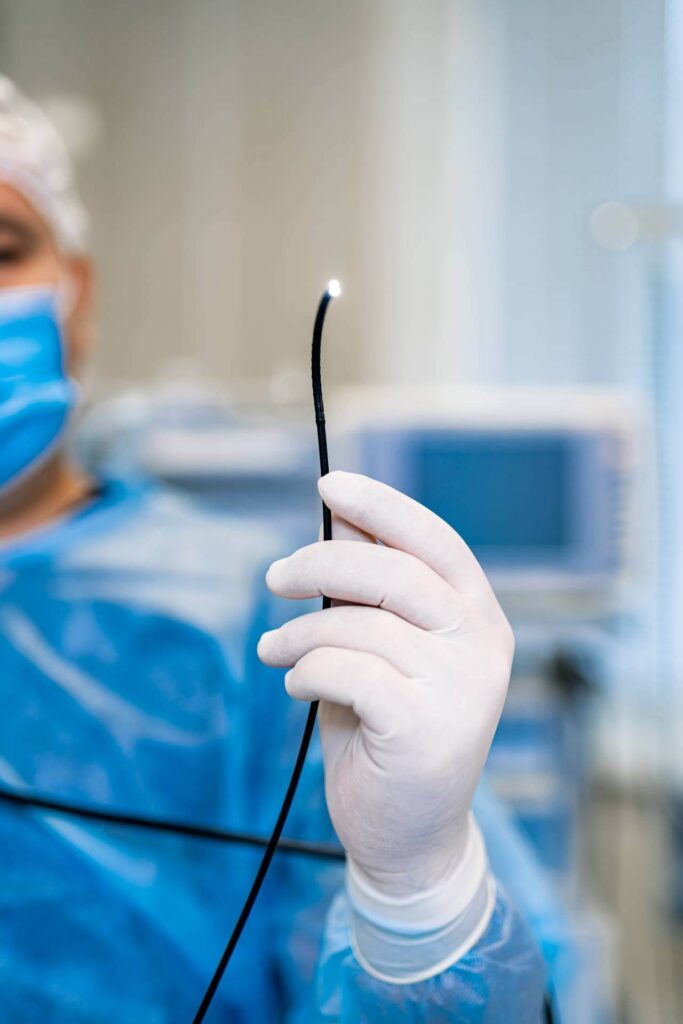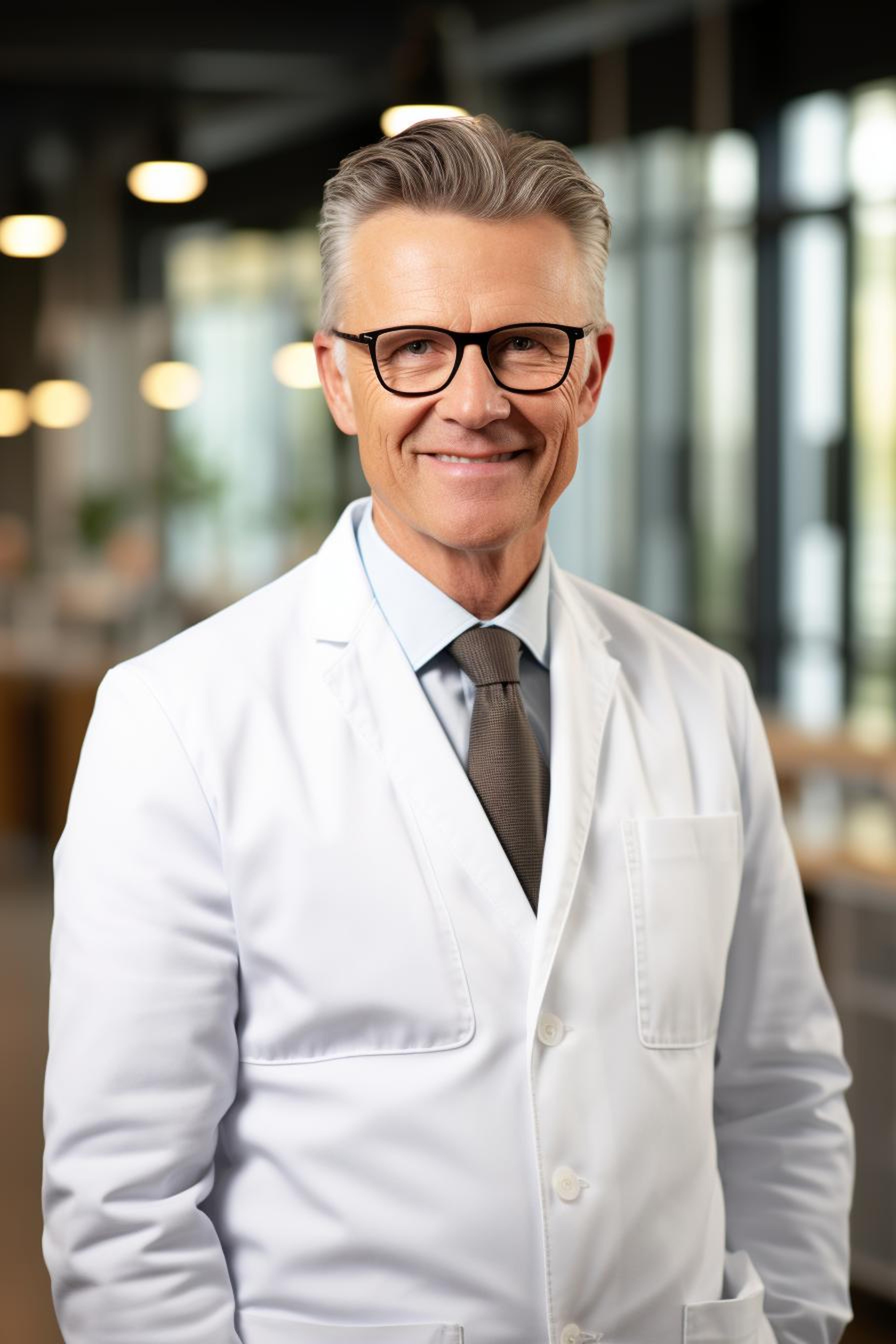Upper GI Endoscopy (EGD) in Dallas, TX
What is an upper GI endoscopy?
An upper GI endoscopy, also known as an esophagogastroduodenoscopy (EGD), is an endoscopic procedure in which a lengthy, skinny, adjustable tube, or “scope” as it is also known, is positioned into a patient’s mouth and snaked to the beginning of the small intestine, known as the duodenum. The scope includes a camera and light at the end, which allows our GI specialists at Digestive Health Associates of Texas to more easily treat the lining of the esophagus, belly, and the first portion of the small intestine.
An EGD in Dallas, TX is suggested as a way to determine the reason for GI problems, such as pain in the abdomen, heartburn/reflux, trouble swallowing, bleeding, or abnormal x-rays. We may also perform an EGD on an individual with chronic symptoms of heartburn to screen for signs of esophageal cancer. If you need an EGD, contact Digestive Health Associates of Texas to find a GI specialist near you.

What are the benefits of an EGD test?
Having an EGD exam is beneficial for several reasons. The exam can allow your GI specialist the opportunity to examine the inner lining of your esophagus, stomach, and the first portion of the small intestine (called the duodenum). Other advantages of an esophagogastroduodenoscopy include:
- Can help identify the causes of symptoms like heartburn, nausea, vomiting, and pain
- Allows for the removal of polyps, the biopsy of tissues, and additional small procedures
- Assists in detecting multiple digestive problems (including gastrointestinal infections, celiac disease, GERD, Crohn’s disease, and more)
- Generally speaking, this test is a safe, quick, and efficient process
What happens the day before my upper GI endoscopy?
You will get pre-op instructions from your gastrointestinal doctor explaining the required preparation for your upper GI endoscopy prior to your appointment. Most patients will be able to eat as any other day on the day leading up to their EGD. Our GI specialists may request you not eat or drink past 12am other than medications. It is vital that you abide by the instructions provided by your doctor. We’ll also give you more direction regarding any medications you take. Typically, you can take your medications as you normally would. However, there are certain situations this may not be true, especially in regard to blood thinners (i.e., Plavix, Coumadin, warfarin, anti-inflammatories, aspirin), or if you have diabetes. If this pertains to you, your doctor will give you specialized instructions.
What should I expect on the day of my upper GI endoscopy?
We will ask you to get to your EGD in Dallas, TX at least an hour prior to your procedure. You will have to change into a procedure gown. An intravenous (IV) catheter will be started in your arm so we can begin the sedation process. You will be connected to equipment that will allow your doctor in Dallas, TX to track your heart rate, blood pressure, and more throughout your exam.
After settling into your private exam room, we’ll have you lie on your left side on the stretcher. IV sedation will begin. After you’re sedated, we’ll gently insert the endoscope into your mouth. The endoscope will be carefully advanced through your esophagus, stomach, and the first portion of the small intestine, the duodenum. We will inject a small amount of air through the scope into the GI tract, which will help us see better. Any fluid remaining in the upper gastrointestinal tract will be removed through the endoscope. Depending on the findings of the exam, a number of things could be implemented, including control of bleeding, the removal of polyps, and biopsies. Typically, the upper GI endoscopy takes between 10 – 20 minutes. Following your exam, you will be taken to one of our comfortable recovery rooms to be monitored as the sedation wears off.
When can I expect my exam results?
Following your upper GI endoscopy at our Dallas, TX office, our GI specialist will review the findings of your examination with you. A lot of patients won’t remember what they are told later on because they have a foggy brain due to the sedation. It is recommended you bring someone with you to this discussion. You will also go home with a typed report. In most situations, you will be informed of any biopsy results in a week.
Are there any risks with an upper GI endoscopy?
In general, an EGD is a very safe procedure. Overall, problems develop in fewer than 1% of cases. Many of these problems are not life or death; however, if a complication occurs, it may result in hospitalization and surgery. Before the exam, a consent form will be shared with you by our team. Should you have any questions or concerns, these can be discussed with your GI specialist prior to your treatment.
Like other tests, the esophagogastroduodenoscopy is not perfect. There is always a small, known possibility that irregularities, like cancers, might be unnoticed during the EGD. It is crucial to maintain visits with your doctors and let them know about recent or persistent problems.
What are alternatives to an esophagogastroduodenoscopy?
To a certain extent, your substitutes to the exam will depend on the motive for needing an upper GI endoscopy in the first place. Typically, an upper GI endoscopy is the standard method to check for and take care of abnormal results in the upper GI tract. However, an upper GI/barium swallow, a special type of x-ray, can evaluate your upper GI tract as well. This is, keep in mind, only a diagnostic exam. Treatment of findings could involve further steps.
EGD FAQs
Are an EGD and an upper endoscopy the same thing?
You may hear an EGD referred to by a variety of names. In some instances, it might be termed an “upper endoscopy” or a “gastroscopy.” Though these names may be different, they are generally the same procedure as an EGD.
What are considered "normal" results for an EGD procedure?
Normal results for an EGD generally indicate that your physician did not identify areas of concern in the upper part of the gastrointestinal tract. However, normal results may be signified by a normal color and smooth texture in your esophagus, stomach, and duodenum. Furthermore, there should not be any evidence of growths, bleeding, or inflammation within these structures. It’s important to keep in mind that a “normal” result doesn’t always mean that no medical conditions are present. Some health conditions might not be visible with this type of test or could be present further down in the gastrointestinal tract, outside the reach of the endoscope utilized to conduct the procedure.
Why would an EGD be recommended?
Your Digestive Health Associates of Texas provider might recommend an EGD if you have Crohn’s disease or liver cirrhosis to help keep track of such medical conditions. An EGD exam might also be recommended if you are experiencing:
- Tarry or black stool
- Vomiting of blood
- Heartburn
- Upper abdominal pain or discomfort
- Issues with swallowing
- Unexplained loss of weight
- Persistent nausea
What should I bring to my EGD appointment?
When you arrive at the facility for your EGD, you might be asked to fill out a few forms. Therefore, you should bring your insurance card and ID with you to your appointment. It also can be beneficial to carry a written list of medications you might take, their dosages, and the conditions for which you take them. We suggest that you leave jewelry and other types of valuables at home.

